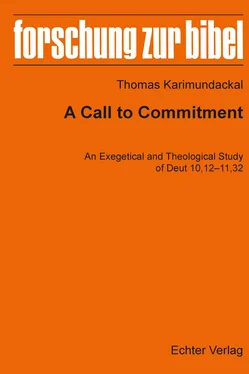The unit begins with an urgent call to 9,1) שׁמע ישׁראל; cf. 4,1; 5,1; 6,4) to understand Yhwh’s faithfulness and Israel’s faithlessness to the fundamental demands of the shema (6,4-5), 32typified in making the golden calf (v7-17). The call to know (ידע) in v3 and v6 is directed to having a right knowledge of Yhwh, i.e., to know Yhwh and to deepen trust in his grace and faithfulness. Against their false claim to righteousness (9,4a), they must know that it is the Lord who destroys (9,3 שׁמד) and subdues (9,3 כנע) the nations and gives them (9,6 נתן) the land to inherit it (9,6 ירשׁ). The call to know (ידע) in v6 is also directed to knowing their nature, i.e., being stiff-necked (9,6 כי עם־קשׁה־ערף אתהb). 33Thus, in the context of their continuous unwillingness to obey the Lord Moses reminds them that they cannot claim righteousness and posses the land on their own merit but only by the grace of Yhwh.
2.1.2 Israel’s faithlessness and Yhwh’s faithfulness
9,7- 10,5 is not merely concerned with the covenant breach at Horeb, though it is recorded as the main event, but with the general sinfulness of Israel, which the golden calf typifies. 34Moses recalls their defiant nature from the time they left Egypt till they arrived at the Jordan: they are stiff-necked (3] קשׁה־ערףx] 9,6.13.27), rebellious (3] מרהx] 9,7.23.24), wicked (9,27 רשׁע; cf. 9,4-5), prone to sin (9,18.21.27 חטאת ;9,16.18 חטא) and provocative (קצף 9,7.8.22; 9,18 כעס), doing evil (9,18 הרע לעשׁות), acting corruptly (9,12 שׁחת), turning aside (9,12.16 סור) from the ways that he commanded, not believing him (9,23 אמן), and not hearing his voice (9,23 שׁמע).
The double imperative of 9,7, זכר אל־תשׁכח calls to mind Israel’s persistent sinfulness and rebelliousness (למן־היום אשׁר־יצאת מארץ מצרים עד־באכם 9,7 עד־המקום הזה). The use of both verb and noun from √חטא also adequately demonstrates the sinful behaviour of Israel (qal in vl6.18; noun in v18.21. 27). 35Making the golden calf, which is a “sinful thing” (9,21 ואת־חטאתכם) is indeed a clear infringement of the first two commandments (cf. 5,6-11; 6,4). The seriousness of Israel’s sin is manifested by the anger of Yhwh (אנף v8; קצף v19), that even Aaron stood under the wrath of Yhwh (אנף v20) and his decision to destroy them (שׁחת ;9,8.14.19.20.25 שׁמד v26). They are basically stiff-necked ( 36(9,6.13.27 קשׁה־ערף and rebellious (9,7.23.24 מרה). V22-24 list various places where Israel sinned showing their continual rebellion.
Moses’ fasting and intercession (v18-29) averts the perilous situation after the covenant break in Horeb (v7-17). 37However, it is the sinful behaviour which is crucial for Israel, and Moses never overlooks Israel’s sin but openly mentions it. 38His fasting for forty days and nights is placed between the breaking of the stone tablets (v17) and the crushing of the golden calf into dust (v21) showing the gravity of their sin. In v18b Moses characterizes Israel’s crime as ‘all the sin they had sinned by doing evil in the Lord’s eyes’. Indeed v27b is a clear statement of Israel’s inherent sinfulness referring back to v6-7, with words such as stubborn, wicked and sinful. 39Yhwh is asked simply to overlook this on account of his character and the promise he made to the patriarchs (v26-28). 40Therefore, the grounds of Moses’ intercession are not their merit but God’s unique relationship with them and the mighty deeds he did for them (v26), the promise he made to their forefathers (v27) and his reputation among the nations (v28).
In contrast to the negative portrait of the people, v18-29 bring forth the powerful intercessory role of Moses. It is the intercession of Moses that moves the Lord to a new affinity towards the rebellious Israel. He fasts forty days and nights twice (9,9.18) risking his life in the context of the Lord’s great anger and wrath (9,19). Moses’ actions in v15-17 correspond to Yhwh’s instructions in v12-14. Thus, the sinfulness of the people (v12.16) is contrasted with Moses’ obedience in response to Yhwh. 41Moses intercedes for both Israel (v19a) and Aaron (v20) in the wake of Yhwh’s anger and wrath against them and so Yhwh spares their life. He destroys the golden calf - the fruit of their sin (“your sin” 9,21 חטאתכם). He mitigates Yhwh’s anger (אנף v8.20; קצף v19) to destroy the people to the point of his ‘unwillingness to destroy’ them (10,10 לא־אבה יהוה השׁחיתך). He enjoys an extraordinary relationship with Yhwh - i.e., Yhwh listens to him whenever he prays (10,10 ;9,19 וישׁמע יהוה אלי). Therefore, as they are preparing to cross the Jordan they must understand that it is Moses - Yhwh’s chosen one - whose intercessions make possible a future in the land.
The reinstatement of the two stone tablets in 10,1-5 resolves the crisis of the golden calf and restores the covenant relations between Israel and Yhwh. בעת ההוא of 10,1 links the actions of 10,1-5 with Moses’ intercession (9,25-29), showing that his prayer is heard. 4210,1-5 emphasize that the new tablets are identical to the original stone tablets: “like the first” כראשׁנים (v1), “that were on the first tablets” אשׁר היו על־הלחת הראשׁנים (v2), “like the first” כראשׁנים (v3), “as the first writing” כמכתב הראשׁון (v4). V4 further stresses that it was the Lord himself who wrote the tablets at the first ‘writing’ and gave them to Moses. Thus, v1-5 shows that it is the same covenant which is reinstated without any conditions 43and the restoration of the covenant is solely due to divine grace. 44
2.1.3 Resumption of Israel’s journey
Deut 10,6-11 describe a new turn in the narrative, i.e. the resumption of Israel’s journey to the Promised Land. Because of Moses’ successful intercession the covenant is renewed and now they may resume their journey to the land. Deut 10,6-11 resolve the problem of Israel’s sin. The mention of the death of Aaron in v6b shows that Moses’ prayer for Aaron (9,20) is answered. The positive tone of the itinerary mentioned in v6-7 45replaces the rebellious tone of the itinerary in 9,22-23. V8-9 shows Yhwh’s commitment to an ongoing relationship with the Levites whose נחלה (cf. v9; 9,26.29) is Yhwh himself, showing that the Aaronic priesthood continues through his son Eleazar. 46The command to continue the journey in 10,11 (cf. 2,2) shows that the promises to the patriarchs will be fulfilled despite the people’s sin. 47The explicit reference to the land in v11 also shows the resolution of the ‘spy incident’ mentioned in 9,23-24. 48Thus, all the sins of Israel’s past are now forgiven and Israel is asked to cross the Jordan to possess the land. In short, 10,6-11 functions as a transitional passage to 10,12-11,32.
2.1.4 Explicit connections between 9,1-10,11 and 10,12-11,32
The repetition of certain phrases, themes and motifs of 9,1-10,11 in 10,12-11,32 shows their intrinsic relationship to each other and provides a contextual significance for 10,12-11,32.
• Deut 9,1-10,11 begin by mentioning that Israel is to cross the Jordan to take possession of the nations (אתה עבר היום את־הירדן לבא לרשׁת גוים 9,1). Similarly, 10,12-11,32 end with an assertion that Israel is to cross the Jordan to take possession of the land which the Lord is giving them (11,31 אתם עברים את־הירדן לבא לרשׁת את־הארץ). Therefore, as they are preparing to cross the Jordan, the events mentioned in between, especially the golden calf incident (9,7-10,5), have an exhortative and teaching function. The descriptions of the nations in 9,1 and 11,23 (גוים גדלים ועצמים מכם) go hand in hand, and in 11,23 Moses recalls once again that it is the Lord who drives out all these nations (11,23 והורישׁ יהוה), a theme repeatedly introduced in the introductory verses 9,1-5 (cf. ירשׁ hiphil [3x] 9,3.4.5). Yhwh’s swearing (11,9.21 ;10,11 ;9,5 שׁבע) to the “fathers” forms a link to 10,12-11,32 (11,9.21 אבתיכם →10,11 אבתם ;9,5 אבתיך; cf. 9,28 אשׁר־דבר להם 11,25 כאשׁר דבר לכם →). The prayer to remember “your servants” (9,27 עבדיך) Abraham, Isaac and Jacob in 9,27 is grounded in 10,15.22 by specifying Yhwh’s elective choice and special love towards their fathers (10,15.22 אבתיך).
Читать дальше












